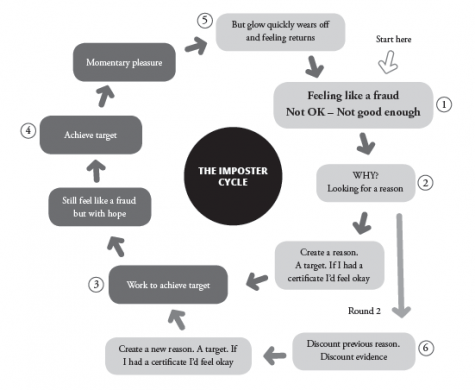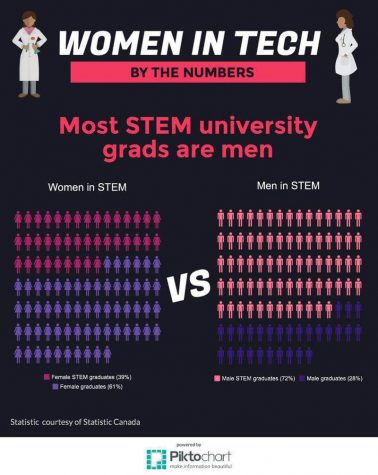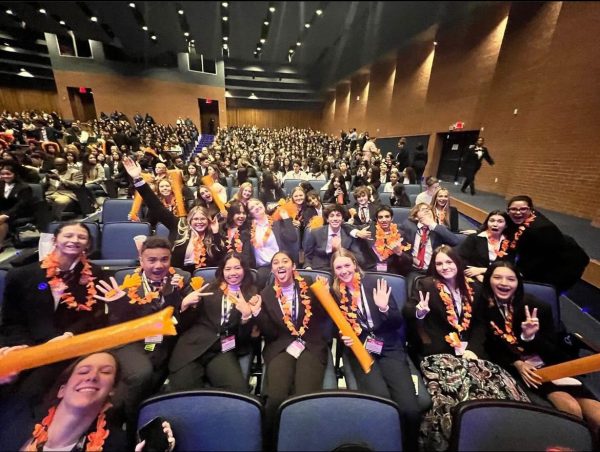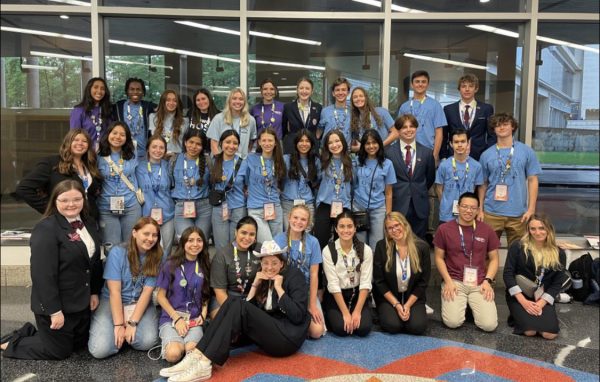What is Impostor Syndrome?
A look into a condition called impostor syndrome and its effects on women specifically in the STEM field.

Why Is Imposter Syndrome Even a Thing? Photo Cred: GETTY Images
Have you ever felt like you were undeserving of your accomplishments? That your achievements happened by pure luck or mistake? Afraid that others would discover you to be a “fraud” or “faker”?

These are all feelings of a sensation known as impostor syndrome– a condition described as the inability to accept one’s achievements and the persistent fear of being exposed as a fraud despite there being external evidence of one’s accomplishments. Although this condition is experienced by many people, it is most commonly evident in women and ethnic minorities (this article will focus on its impacts on women specifically in the STEM field). This feeling can hold people back from achieving their full potential, whether it be in the workplace, area of higher education, etc. This could provide a possible explanation for the lack of diversity in positions of higher power in the political, business, and scientific fields.
According to UIS data, less than 30% of the world’s researchers are women. Additionally, in 2015, women received over half of bachelor’s degrees awarded in the biological sciences, they received far fewer in the computer sciences (18%), engineering (20%), physical sciences (39%) and mathematics (43%), and in 2016, 12.6% of bachelor’s degrees in science and engineering, 7.8% of master’s degrees in science and engineering, and 5.0% of doctorate degrees in science and engineering were awarded to minority women according to statistics from the NGC Project.
To gain more insight into the effects impostor syndrome in college and the work field, I interviewed Elizabeth Shaw, an alumni of Texas A&M who graduated with a degree in engineering. According to Shaw, when she “began college in ‘91, there were not many women in engineering at all. As a matter of fact, there were not many girls pursuing STEM outside of medicine”. She was very involved in computer building and was exposed to the silicon valley at an early age where her dad worked overseas and in the states. “With all of this,” Shaw says, “it never crossed [her] mind that [she] couldn’t be in engineering because [she] was a girl until [she] came to Texas A&M”. She joined the Society of Women Engineers Club and remained a Women in Engineering mentor for many years after college, leading her to start with a group of women the “Great Place to Work Initiative” at Accenture which became very instrumental to many other programs in larger fortune 500 companies leading to now what we have with women’s initiatives throughout.
While you were attending college, how many girls do you remember being in the engineering program?
I don’t remember numbers but I can probably find those for you. Not many.
https://engineering.tamu.edu/media/35037/college-stats-engineering-women.pdf
When did you start experiencing impostor syndrome?
Impostor syndrome is defined as a true feelings of inadequacy despite having successes throughout essentially, right. Being an only child, I was pretty confident I could do this degree. I was a strong 4.0 math student from high school and throughout all of my math at A&M. However, when I got there I became overwhelmed by the implementation of my classes as the boys always thought they had a better handle on the labs. It almost hampered me at first as I didn’t speak up and let them take the lead. This was my way of keeping the peace in group settings as I didn’t like confrontation. Since there were not that many girls, we were often paired up with mostly boys in all classes. I also faced this feeling of intellectual superiority by the males in engineering when they kept asking me what I was going to do and…if this was too challenging for me that I could always try something else. Truly because you know my personality, this fueled me onward to be stronger and make better grades.
How long did this last?
This lasted throughout my time at A&M. There was always a group of people or a few bad seeds in the bunch that couldn’t get past a woman in stem or engineering.
What difficulties did you face during college due to experiencing this?
I didn’t face difficulties because of my personality to overcome and see the positive in most people. I would just not take no for an answer and forge ahead. I can see that if you were a shy young lady this would be hard. I was not shy but very extroverted in college and that lead to my confidence. I also relied heavily on my faith. I knew that God had a plan for me to be here and it was His plan for me to stay and continue to strive for excellence.
After you graduated college, did you experience this in the work field?
I ended up not taking a true engineering job but one where I had to use my technical skills, critical thinking and business skills together for consulting. The funny thing here was that my personality helped me overcome. Many boys in my class in engineering were very one-dimensional and had a hard time bringing all these skills together. However, the glass ceiling was very different for men and women in the workplace. When I came out it was still a man’s world. But there was enough of us that we pushed forward. I worked harder than most and never left room for them to find fault. I also fought for my rights as a woman to be seen and heard. I balanced family life and work to the best of my ability, but not apologizing for being a wife and mom.
Have any male coworkers or classmates ever looked down on you or made undermining remarks (whether it be intentional or unintentional)?
I have had many boys in engineering be condescending to me thinking that I didn’t know what was going on until they saw that I made a higher or the same grade as them. There was always remarks being made but you had to ignore them. I had very supportive parents and my dad that told me the sky’s the limit and I could do anything I set my mind to. That confidence and support fueled my fire to continue on. Most of the time it came from a place of ignorance and was unintentional. I was on a conference call at work once where my maternity leave was questioned as I was up for a significant promotion and I tried to respectfully and confidently speak on my contributions over the year.
How did you learn to break past impostor syndrome?
You never get fully past the impostor syndrome, but you learn how to continue to push yourself past the glass ceiling. It’s important to know how to handle it and handle it with grace. You’re not here to condemn others for their views but to change hearts by working harder and performing with excellence. I never got confrontational and don’t believe that is always required. Don’t get me wrong, I never caved on matters that were important. It’s important to fight this with being creative and thinking out of the box. It’s important for women to be heard without having to scream and shout. We are not going to win this battle by being confrontational. I put my energies into programs for women in the workplace and advocating for women daily.
What advice would you offer to young women pursuing a career in STEM fields?
The best thing you can do is to persevere and work as hard as you can. From the first day in AP computer science when we were assigned the special project of creating software for a competition till now, I have never looked back. The software my teammates developed on that day is still being used for elementary age students. Women have made so many significant impacts on STEM with our ability to see things differently at times. We add value to the table, and we have a right to be there leading the charge. You will never get critical thinking skills like you will through engineering.
Although the gender gap is slowly closing, there is still a significant difference between men and women who are involved in the STEM field. At Kingwood High School, approximately 51% of the school’s demographic consists of females. However, in the school’s AP Physics C class that’s geared towards prospective engineers, doctors, and etc, only a handful of those enrolled are girls and the rest are males.
Despite all of this, the number of females pursuing a career in the STEM field have generally increased the last couple years, thanks to the rise of more STEM programs catered towards females and more encouragement and support from educators and families. More awareness is also being raised about the effects of impostor syndrome and how to combat it.

Daphne Han is a senior at Kingwood High School who is incredibly passionate about equitable education, science communication, and research. She is very...






